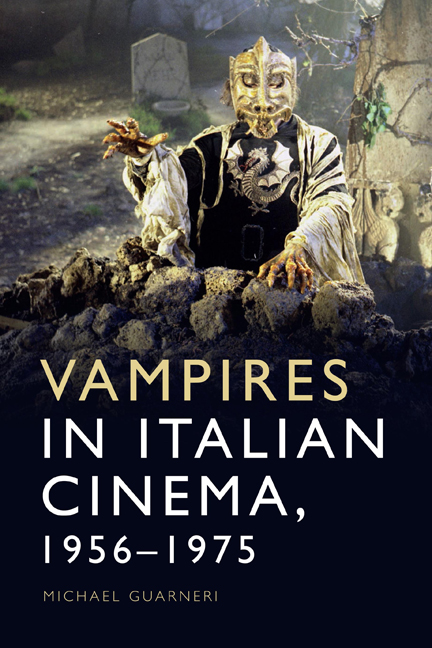Book contents
- Frontmatter
- Contents
- Figures and tables
- Acknowledgements
- Introduction
- PART I THE INDUSTRIAL CONTEXT
- PART II VAMPIRE SEX AND VAMPIRE GENDER
- PART III SANGUINE ECONOMY, BLOODY POLITIC
- Appendix A Three Italian vampire films that were never made
- Appendix B Files from the Italian Show Business Bureau fonds at the Archivio Centrale dello Stato in Rome
- Bibliography
- Index
6 - Post-1968 vampires
Published online by Cambridge University Press: 10 October 2020
- Frontmatter
- Contents
- Figures and tables
- Acknowledgements
- Introduction
- PART I THE INDUSTRIAL CONTEXT
- PART II VAMPIRE SEX AND VAMPIRE GENDER
- PART III SANGUINE ECONOMY, BLOODY POLITIC
- Appendix A Three Italian vampire films that were never made
- Appendix B Files from the Italian Show Business Bureau fonds at the Archivio Centrale dello Stato in Rome
- Bibliography
- Index
Summary
FROM THE ‘BOOM’ TO AUSTERITY
If horror parody Tempi duri per i vampiri and the early-1960s vampire horrors and vampire-themed pepla were at best timidly politicised, bringing to the fore ‘a desperation related to the present but often expressed through the disguise of the past’ (Curti 2011: 8), Italian vampire cinema from the 1970s tackled then-current political and socio-economic issues more directly, adopting a prevalently contemporary setting, and openly and abundantly referencing Marx and trendy Marxist thinkers of the day. As for the latter characteristic, the main sources of inspiration were the writings of world-renowned foreign intellectuals like critical theorist Herbert Marcuse, although post-war Italy had its very own Marxist tradition of ferocious critique of consumer capitalism (as we shall see further below, the most famous representative of such tradition, Pier Paolo Pasolini, made use of the vampire metaphor in a 1968 article indicting the infectiousness of bourgeois conformism). The 1970s politicisation of Italian vampire cinema is the result of two factors. On the one hand, we have the end of the most acute phase of the Cold War in Italy, sanctioned by Prime Minister Fernando Tambroni's resignation in summer 1960 and by the official alliance between Christian Democrats and Socialists in late 1963, which led, among other things, to the appointment of Socialist Achille Corona as the Minister of Tourism and Cultural Activities after more than fifteen years of Christian Democrat rule over the Italian Show Business Bureau. On the other hand, we have a new political conscience developed by students and workers facing the inequalities and distortions brought about by the ungoverned ‘boom’ of 1958–1963 and the post-1963 failure of the reformist program of the centreleft coalition. The second factor deserves in-depth contextualisation, as the six vampire movies analysed in this chapter –… Hanno cambiato faccia, La corta notte delle bambole di vetro, Il prato macchiato di rosso, L’uomo che uccideva a sangue freddo, Dracula cerca sangue di vergine … e morì di sete!!! and Il cav. Costante Nicosia demoniaco, ovvero: Dracula in Brianza – were all made in the aftermath of the anti-establishment student protests of 1968 and the autunno caldo (‘hot autumn’) of 1969–1970, when the student movement joined forces with exploited factory workers, leading to an unprecedented mass revolt against the capitalist class and the parties of parliamentary politics that would last until the late 1970s.
- Type
- Chapter
- Information
- Vampires in Italian Cinema, 1956-1975 , pp. 149 - 172Publisher: Edinburgh University PressPrint publication year: 2020



